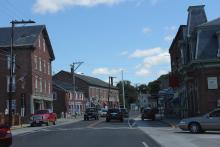OTO Fiber in Maine Releases RFP; Responses Due March 8th
The neighboring towns of Orono and Old Town in Maine are working with the University of Maine System in an effort to bring better connectivity to their region. The three launched the nonprofit OTO Fiber several years ago in an effort to join forces for better broadband. After battling for funds with the incumbent cable Internet access company, they’re finally in a position to release a Request for Proposals (RFP) for fiber optic construction. Responses are due March 8th, 2019.
Open Access for A University Community
OTO Fiber aims to deploy an open access network in order to spur economic development, to encourage innovation and local entrepreneurship, and to improve access to University resources. The project described in the RFP is considered a pilot and will cover a limited area in each of the three communities. OTO Fiber’s intention for the pilot is to determine take rate and the benefits in order to establish whether or not to expand the symmetrical gigabit network to businesses and residents in both towns. Network designers have strategically developed a plan for the six-mile backbone to facilitate later expansion.
Orono is the location of the University of Maine’s flagship campus, where symmetrical gigabit connectivity is a necessity. According to the RFP:
The University of Maine System provides networking to schools and libraries across the State of Maine and provides multiple paths into and out of the State for research and education. Furthermore, the University is the largest concentration of computational resources and data storage in the State. These connections and resources, both computational and human, are expected to help make the proposed project successful.
Past Problems
In 2015, the OTO Fiber partners had been awarded ConnectME funds for the project, but cable ISP incumbent Time Warner Cable (now Spectrum) successfully blocked the $125,000 grant. The partners had planned to work with Maine ISP GWI for a stretch of about four miles in which 320 potential subscribers would have access to a larger network.










 Organized in 2015, the nonprofit DEDC came together with the focus on recruiting new businesses to the area and to support existing businesses. As DEDC quickly discovered, unless the region could offer high-speed, reliable Internet infrastructure, attracting new businesses and helping existing businesses expand would be extremely difficult. They also determined that new families would not be interested in Baileyville or Calais without high-quality connectivity. "It was a no-brainer," says Julie, "you have to go fiber."
Organized in 2015, the nonprofit DEDC came together with the focus on recruiting new businesses to the area and to support existing businesses. As DEDC quickly discovered, unless the region could offer high-speed, reliable Internet infrastructure, attracting new businesses and helping existing businesses expand would be extremely difficult. They also determined that new families would not be interested in Baileyville or Calais without high-quality connectivity. "It was a no-brainer," says Julie, "you have to go fiber."